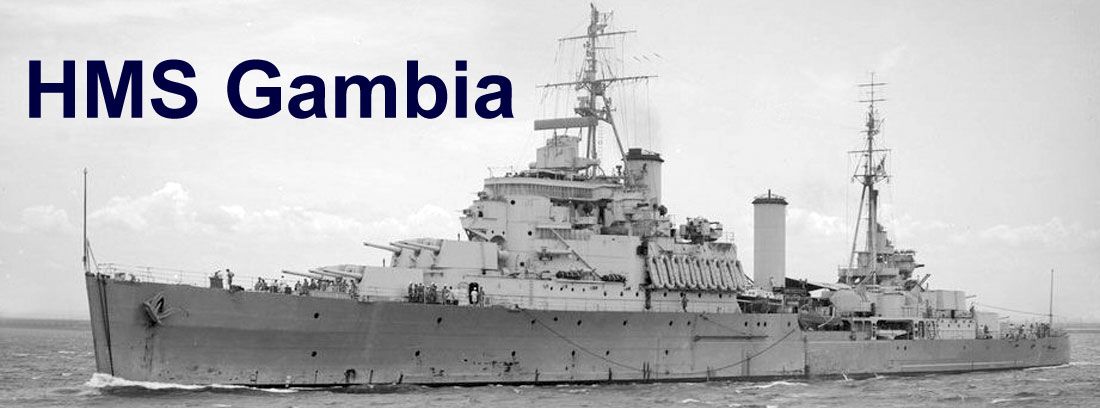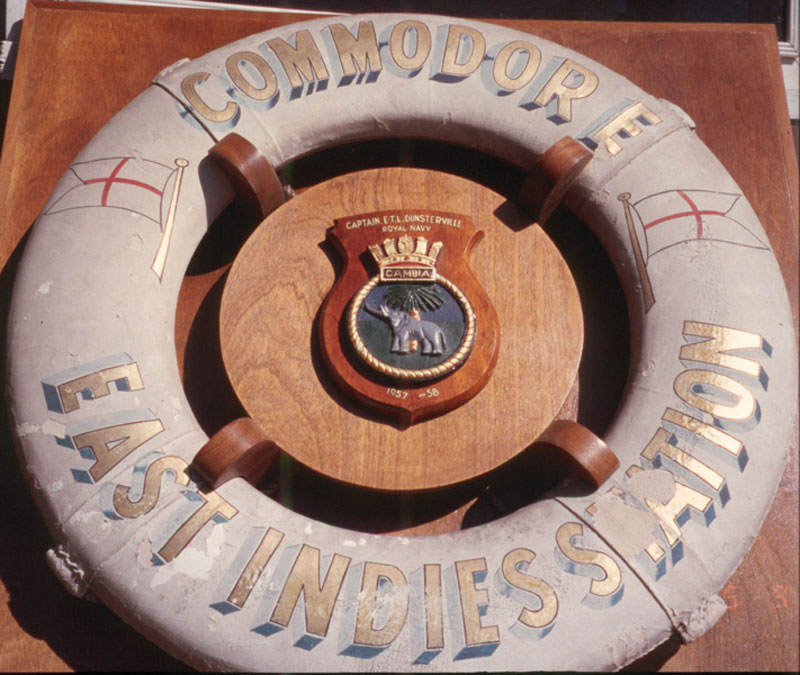
Edward Trevor Lloyd "Dusty" Dunsterville
Captain Dunsterville passed away on Jly 30, 2001. He was captain of MMS Gambia for the 1957/58 commission.
From The Telegraph - August 21, 2001 & Bucks Free Press - August 23, 2001
Captain , Edward "Dusty" Dunsterville who has died aged 88, was Mountbatten's flotilla signals officer in the Kelly; he was one of the few officers whose character featured in Noel Coward's film In Which We Serve (1942), set in the aftermath of Kelly's sinking by German dive-bombers in 1941.
He was twice mentioned in dispatches during the Second World War and was later the youngest captain in the Navy. During the 1950s, he oversaw many of the key developments in modern naval signalling and was in charge of naval planning for Suez.
Edward Trevor Lloyd Dunsterville was born on January 25 1913 on Jersey, the son of Major (later Colonel) Herbert Dunsterville, RA. He spent his childhood at Woolwich, then in Ireland during the Troubles, where his father commanded the citadel at Cork, and where he recalled going home in the dark at the age of six armed with a service revolver lent to him by his father.
Dunsterville was top of his term at Dartmouth and a term cadet captain. He went to sea for the first time in 1931 and, as a midshipman on the China station in Shanghai, witnessed the Japanese invasion of 1937 from the Bund while dressed in the uniform of the Argyll and Sutherland Highlanders.
After attending the Royal Naval College at Greenwich and then Portsmouth for further technical training, Dunsterville qualified as a signals officer in 1938, again top of his course. In 1939, he joined the destroyer Kelly, the fastest ship in her class, and described by her captain, Mountbatten, as having "the most beautiful lines of any ship I had seen".
As flotilla signals officer to the 5th Destroyer Flotilla, Dunsterville saw various actions in Kelly in the Channel and Baltic through 1939 and the spring of 1940, and was mentioned in dispatches following the evacuation from Namsos. On the night of May 9 1940, Kelly found herself in foggy weather off the coast of Denmark.
Several of her crew later recalled having noticed the dim shape of the German E-boat; shortly afterwards, what appeared to be a whipping tow-cable rising from the sea brought cries of "Torpedo!"
On the bridge, they thought at first that it had been set too deep - Mountbatten even exclaimed, "Thank God that one was a dud!" - but then came a tremendous explosion from below, and everyone was thrown about. Dunsterville hit his chin on the voice-pipe and smashed some of his teeth.
The torpedo had struck Kelly in the forward boiling room, tearing a hole in the plating some 40 feet long, killing 27 of the ship's company, and almost breaking her in two. She was taken in tow by the destroyer Bulldog but had small chance of survival, as a gale sprang up shortly afterwards.
For four days, Kelly was at the mercy of the seas, and on some occasions had to be temporarily abandoned by her crew. There were frequent attacks by enemy aircraft, all of which were successfully beaten off.
Kelly was eventually brought safely to harbour and repaired, and by May 1942 was back in action bombarding German positions on the island of Crete. At daybreak on May 23, Kelly and her fellow destroyer Kashmir attacked two caiques carrying troops and ammunition, an action that brought upon them the unwelcome attention of German dive bombers.
From 5.30am they were repeatedly attacked. Kashmir was struck amidships and sank immediately. Kelly was soon also hit, and she too sank with great rapidity, drowning nine officers and 119 ratings. On the bridge, Dunsterville and Mountbatten had seen the fatal bomb coming straight at them and knew it could not miss.
They remained perfectly calm, holding on as the ship tilted. Dunsterville later recalled "clinging on for as long as I could - then I was swept down, came up too near the propellers for comfort and went down again". When he resurfaced, he found "a lot of us bobbing about and we found bits of wood to hold on to". Eight officers, including Dunsterville and Mountbatten, and 120 ratings were rescued.
After the sinking of Kelly, Dunsterville served on Admiral Cunningham's staff at Alexandria, where he helped set up the naval signalling equipment for the Eighth Army. He returned to Britain via Lisbon on the second commercial flight to England, the first one having been shot down.
He was posted to the Far East and served again with Mountbatten in Ceylon. He finished the war as fleet signals officer to C-in-C East Indies (Admiral Power).
After the war, Dunsterville went as Commander (Applications) to the Signals Research Establishment at Haslemere, Surrey, where he helped set up the modern system of naval signalling. In 1951, he got his first command on the frigate Loch Quoich, based in Ceylon, and the next year was promoted Captain, the youngest then in the fleet.
As Chief Staff Officer for the Mediterranean Fleet, he was responsible for naval planning of Suez, and in 1957, as Captain of the cruiser Gambia, he took her through Suez as the first ship to make passage after the crisis. He became Director Signals Division in 1959 and retired from the Navy the next year. He then joined Racal Electronics, becoming director of Racal Slough.
After final retirement in 1973, Dunsterville served as a local councillor for Maidenhead and Windsor, and as chairman of Bisham Parish Council. Edith Randall, a close friend and colleague of Mr Dunsterville on Bisham Parish Council, described him as a great man. She said: "Everyone admired him. He was full of charm and dignity and was very modest. He really was a remarkable man." He was a member of the local Conservative Association and involved with the NSPCC. He travelled extensively, and wintered in Spain.
Dusty Dunsterville married, in 1940, Justine Marcel; their engagement was portrayed in In Which We Serve, as a party on board Kelly for "Flags". She died suddenly from cancer in 1990; he was buried alongside his wife at Bisham Church on August 4, 2001. He is survived by their son and daughter.

The photograph above was kindly donated by Sally Bradden, daughter of Captain Dunsterville.